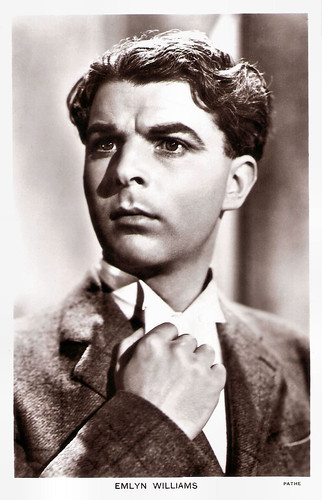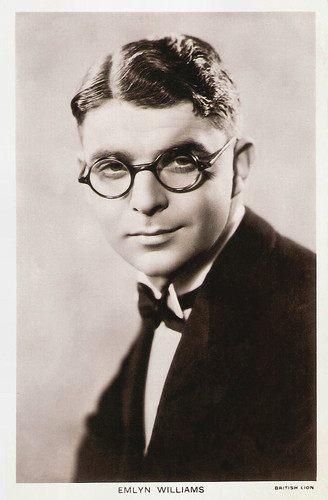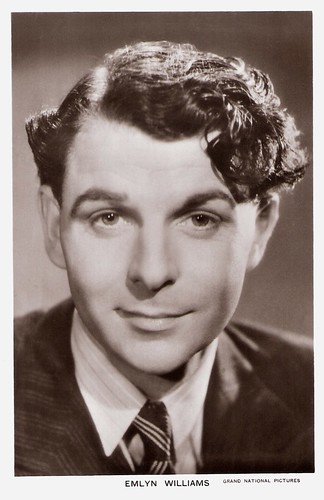Emlyn Williams (1905-1987) was a Welsh dramatist and actor. He became an overnight star with his thriller Night Must Fall (1935), in which he also played the lead role of a psychopathic murderer. Another hit play was The Corn Is Green (1938). Both were filmed successfully.

British postcard in the Picturegoer Series, London, no. 817a. Photo: Pathe. Publicity still for Night Alone (Thomas Bentley, 1938).
George Emlyn Williams was born into a Welsh-speaking, working class family in Glan-yr-afon in northeast Wales, in 1905. Aged 11 he won a scholarship to Holywell Grammar School. There teacher Sarah Grace Cooke recognised his literary talent, encouraged him and helped him win a scholarship to Oxford, where he attended the college of Christ Church. She is immortalised in the character of Miss Moffat in his play, The Corn is Green.
Education enabled him to escape the life at hard labour that was the lot of his people. In Oxford he joined the Oxford University Dramatic Society. His first full-length play, Full Moon, was premiered at the original Oxford Playhouse in 1927. He joined a repertory company and began his stage career.
Williams made his West End debut in And So To Bed, a comedy based on the diaries of Samuel Pepys. He eventually became an accomplished stage and screen actor, but it was as a playwright that he had his greatest success. In the following years, he wrote such works as A Murder Has Been Arranged and The Late Christopher Bean.
He became an overnight star with his thriller Night Must Fall (1935), in which he also played the lead role of a psychopathic murderer. The play was noted for its exploration of the killer's complex psychological state, a step forward for its genre. It was made into a film, Night Must Fall (Richard Thorpe, 1937) with Robert Montgomery, and again thirty years later again as Night Must Fall (Karel Reisz, 1964) now with Albert Finney. It has been frequently revived, including on Broadway in 1999 with Matthew Broderick and most recently in the West End with Jason Donovan.
His other great play was very different. The Corn Is Green (1938) is partly based on his own childhood in Wales. He starred as a Welsh schoolboy in the play's London premiere. The play came to Broadway in 1940 with Ethel Barrymore as the schoolteacher Miss Moffat, was turned into a film, The Corn Is Green (Irving Rapper, 1945) starring Bette Davis, and again into a TV-film, The Corn is Green (1979) starring Katharine Hepburn, under the direction of Williams' close friend George Cukor. A 1985 London revival of the play at the Old Vic with Deborah Kerr was successful.
Emlyn Williams’s autobiographical light comedy, The Druid's Rest was first performed at the St Martin's Theatre, London, in 1944. It saw the stage debut of Richard Burton whom Williams had spotted at an audition in Cardiff. In addition to his stage plays, Williams wrote a number of film screenplays, working with Alfred Hitchcock on The Man Who Knew Too Much, and with Carol Reed and other directors.

British postcard in the Picturegoer Series, London, no. 817. Photo: British Lion. Publicity still for The Frightened Lady (T. Hayes Hunter, 1932).
In 1932, Emlyn Williams made his film debut in the thriller The Frightened Lady (T. Hayes Hunter, 1932). In this adaptation of the Edgar Wallace play The Case of the Frightened Lady, he starred opposite Cathleen Nesbitt. It was a huge success. That year, he also featured in the drama Men of Tomorrow (Zoltan Korda, Leontine Sagan, 1932), which also marked Robert Donat's film debut.
In the following years, Williams appeared in such British films as the operetta My Song for You (Maurice Elvey, 1934) starring Jan Kiepura, the musical Evensong (Victor Saville, 1934) starring Evelyn Laye, and the historical drama The Dictator (Victor Saville, 1935) starring Clive Brook. In Broken Blossoms (John Brahm, 1936), Williams was a Chinese missionary who works in the London slums and helps a young girl (Dolly Haas) being ill-treated by her abusive father.
Then he played the mad Roman emperor Caligula opposite Charles Laughton in the uncompleted I, Claudius (Josef von Sternberg, 1937), based on Robert Graves' novel. A car accident involving co-star Merle Oberon caused filming to be ended before completion. Footage was incorporated into the documentary The Epic That Never Was (1965).
Williams starred as ex-son 'Shorty' in the crime thriller They Drive by Night (Arthur B. Woods, 1938), with Ernest Thesiger. The film was made by Warner Brothers as a quota film under the Cinematograph Films Act 1927. On release in the UK, it was well received critically and author Graham Greene cited how close the thriller came to French cinema with its realism and lack of romanticism.
Emlyn Williams acted in and contributed dialogue to various films based on the novels of A. J. Cronin, including The Citadel (King Vidor, 1938), The Stars Look Down (Carol Reed, 1940), Hatter's Castle (Lance Comfort, 1942) and Beyond This Place/Web of Evidence (Jack Cardiff, 1959). He had a role in Hitchcock's adaptation of Daphne du Maurier's Jamaica Inn (Alfred Hitchcock, 1939), starring Charles Laughton.
In 1941 Williams starred in You Will Remember (Jack Raymond, 1941), based on the life of the popular late Victorian songwriter Leslie Stuart, played here by Robert Morley, with Williams as Stuart's best friend. Also in 1941, he had a principal supporting part as Snobby Price in the G.B. Shaw adaptation Major Barbara (Gabriel Pascal, 1941), with Wendy Hiller and Rex Harrison.
Williams’s only film as a director, The Last Days of Dolwyn (1949), which he also wrote and starred in, marked the screen debut of fellow Welshman, Richard Burton. Williams played a kindly veterinarian who accidentally causes the death of a murderess (Bette Davis) in the suspense drama Another Man's Poison (Irving Rapper, 1952). That year, he also appeared as the fool Wamba in Ivanhoe (Richard Thorpe, 1952) with Robert Taylor and Elizabeth Taylor.
Other screen credits include, his portrayal of Emile Zola in I Accuse! (José Ferrer, 1958), The Wreck of the Mary Deare (Michael Anderson, 1959), and the drama The L-Shaped Room (Bryan Forbes, 1962), with Leslie Caron. On TV, he could be seen in an adaptation of Charles Dickens' David Copperfield, with an all-star cast including Laurence Olivier, Michael Redgrave, Ralph Richardson and Edith Evans.

British postcard in the Picturegoer Series, London, no. 1423. Photo: Grand National Pictures. Publicity still for The Stars Look Down (Carol Reed, 1940).
Emlyn Williams often appeared in his own plays, and was famous for his one-man-shows, with which he toured the world, playing Charles Dickens in an evening of excerpts from Dickens' novels. This ‘one man show’ was the start of a whole new theatrical genre. He followed up his Dickens performance with one man shows based on the works of Dylan Thomas, and H.H. Munro better known under his pseudonym Saki.
His post-war acting credits on stage included The Winslow Boy by Terence Rattigan and The Deputy aka The Representative by Rolf Hochhuth on Broadway. He also was the ‘voice’ of Lloyd-George in the documentary The Great War (1964).
Among Williams' books was the best seller Beyond Belief: A Chronicle of Murder and its Detection (1968), a semi-fictionalised account of the Moors murderers, Ian Brady and Myra Hindley. His 1980 novel Headlong, the fictional story of the unexpected death of the entire British royal family in a freak accident in 1930, and the ascension of a most unlikely heir to the British throne as a result, was the loose basis of the film King Ralph (David S. Ward, 1991) which stars John Goodman and Peter O'Toole. This comedic treatment of Headlong was set in the contemporary United Kingdom.
Williams' autobiography, in the volumes George (1961) and Emlyn (1973), was also highly successful. In both books, he wrote frankly of his homosexual experiences; indeed, he was publicly ‘out’ as a bisexual before other better-known gay literary celebrities, such as his close friend and contemporary Christopher Isherwood.
Williams was married in 1935 to actress Mary Marjorie O'Shann (Molly Shan), who died in 1970. They had two sons, Alan, a writer, and Brook, an actor. Brook Williams became a close friend of Richard Burton's, working as Burton's personal assistant and appearing in many of Burton's films, sometimes even dubbing Burton's voice.
But both during his marriage and following his wife's death, Williams was actively bisexual throughout his adult life. He maintained a relationship from 1981 to 1986 with American theatre journalist Albert N. Williams (no relation), whom Emlyn Williams met while appearing at the Northlight Theatre in the Chicago area with his one-man Charles Dickens show. Emlyn Williams was appointed a Commander of the Order of the British Empire (CBE) in 1962. In 1987, he died at his London flat, aged 81, from complications from cancer.
Trailer Night Must Fall (1937). Source: Tony Baretta (YouTube).
Trailer Another Man's Poison (1952). Source: Cohen Film Collection (YouTube).
Sources: Wikipedia, and IMDb.

British postcard in the Picturegoer Series, London, no. 817a. Photo: Pathe. Publicity still for Night Alone (Thomas Bentley, 1938).
Exploring a killer's complex psychological state
George Emlyn Williams was born into a Welsh-speaking, working class family in Glan-yr-afon in northeast Wales, in 1905. Aged 11 he won a scholarship to Holywell Grammar School. There teacher Sarah Grace Cooke recognised his literary talent, encouraged him and helped him win a scholarship to Oxford, where he attended the college of Christ Church. She is immortalised in the character of Miss Moffat in his play, The Corn is Green.
Education enabled him to escape the life at hard labour that was the lot of his people. In Oxford he joined the Oxford University Dramatic Society. His first full-length play, Full Moon, was premiered at the original Oxford Playhouse in 1927. He joined a repertory company and began his stage career.
Williams made his West End debut in And So To Bed, a comedy based on the diaries of Samuel Pepys. He eventually became an accomplished stage and screen actor, but it was as a playwright that he had his greatest success. In the following years, he wrote such works as A Murder Has Been Arranged and The Late Christopher Bean.
He became an overnight star with his thriller Night Must Fall (1935), in which he also played the lead role of a psychopathic murderer. The play was noted for its exploration of the killer's complex psychological state, a step forward for its genre. It was made into a film, Night Must Fall (Richard Thorpe, 1937) with Robert Montgomery, and again thirty years later again as Night Must Fall (Karel Reisz, 1964) now with Albert Finney. It has been frequently revived, including on Broadway in 1999 with Matthew Broderick and most recently in the West End with Jason Donovan.
His other great play was very different. The Corn Is Green (1938) is partly based on his own childhood in Wales. He starred as a Welsh schoolboy in the play's London premiere. The play came to Broadway in 1940 with Ethel Barrymore as the schoolteacher Miss Moffat, was turned into a film, The Corn Is Green (Irving Rapper, 1945) starring Bette Davis, and again into a TV-film, The Corn is Green (1979) starring Katharine Hepburn, under the direction of Williams' close friend George Cukor. A 1985 London revival of the play at the Old Vic with Deborah Kerr was successful.
Emlyn Williams’s autobiographical light comedy, The Druid's Rest was first performed at the St Martin's Theatre, London, in 1944. It saw the stage debut of Richard Burton whom Williams had spotted at an audition in Cardiff. In addition to his stage plays, Williams wrote a number of film screenplays, working with Alfred Hitchcock on The Man Who Knew Too Much, and with Carol Reed and other directors.

British postcard in the Picturegoer Series, London, no. 817. Photo: British Lion. Publicity still for The Frightened Lady (T. Hayes Hunter, 1932).
The Epic That Never Was
In 1932, Emlyn Williams made his film debut in the thriller The Frightened Lady (T. Hayes Hunter, 1932). In this adaptation of the Edgar Wallace play The Case of the Frightened Lady, he starred opposite Cathleen Nesbitt. It was a huge success. That year, he also featured in the drama Men of Tomorrow (Zoltan Korda, Leontine Sagan, 1932), which also marked Robert Donat's film debut.
In the following years, Williams appeared in such British films as the operetta My Song for You (Maurice Elvey, 1934) starring Jan Kiepura, the musical Evensong (Victor Saville, 1934) starring Evelyn Laye, and the historical drama The Dictator (Victor Saville, 1935) starring Clive Brook. In Broken Blossoms (John Brahm, 1936), Williams was a Chinese missionary who works in the London slums and helps a young girl (Dolly Haas) being ill-treated by her abusive father.
Then he played the mad Roman emperor Caligula opposite Charles Laughton in the uncompleted I, Claudius (Josef von Sternberg, 1937), based on Robert Graves' novel. A car accident involving co-star Merle Oberon caused filming to be ended before completion. Footage was incorporated into the documentary The Epic That Never Was (1965).
Williams starred as ex-son 'Shorty' in the crime thriller They Drive by Night (Arthur B. Woods, 1938), with Ernest Thesiger. The film was made by Warner Brothers as a quota film under the Cinematograph Films Act 1927. On release in the UK, it was well received critically and author Graham Greene cited how close the thriller came to French cinema with its realism and lack of romanticism.
Emlyn Williams acted in and contributed dialogue to various films based on the novels of A. J. Cronin, including The Citadel (King Vidor, 1938), The Stars Look Down (Carol Reed, 1940), Hatter's Castle (Lance Comfort, 1942) and Beyond This Place/Web of Evidence (Jack Cardiff, 1959). He had a role in Hitchcock's adaptation of Daphne du Maurier's Jamaica Inn (Alfred Hitchcock, 1939), starring Charles Laughton.
In 1941 Williams starred in You Will Remember (Jack Raymond, 1941), based on the life of the popular late Victorian songwriter Leslie Stuart, played here by Robert Morley, with Williams as Stuart's best friend. Also in 1941, he had a principal supporting part as Snobby Price in the G.B. Shaw adaptation Major Barbara (Gabriel Pascal, 1941), with Wendy Hiller and Rex Harrison.
Williams’s only film as a director, The Last Days of Dolwyn (1949), which he also wrote and starred in, marked the screen debut of fellow Welshman, Richard Burton. Williams played a kindly veterinarian who accidentally causes the death of a murderess (Bette Davis) in the suspense drama Another Man's Poison (Irving Rapper, 1952). That year, he also appeared as the fool Wamba in Ivanhoe (Richard Thorpe, 1952) with Robert Taylor and Elizabeth Taylor.
Other screen credits include, his portrayal of Emile Zola in I Accuse! (José Ferrer, 1958), The Wreck of the Mary Deare (Michael Anderson, 1959), and the drama The L-Shaped Room (Bryan Forbes, 1962), with Leslie Caron. On TV, he could be seen in an adaptation of Charles Dickens' David Copperfield, with an all-star cast including Laurence Olivier, Michael Redgrave, Ralph Richardson and Edith Evans.

British postcard in the Picturegoer Series, London, no. 1423. Photo: Grand National Pictures. Publicity still for The Stars Look Down (Carol Reed, 1940).
Frankly of his homosexual experiences
Emlyn Williams often appeared in his own plays, and was famous for his one-man-shows, with which he toured the world, playing Charles Dickens in an evening of excerpts from Dickens' novels. This ‘one man show’ was the start of a whole new theatrical genre. He followed up his Dickens performance with one man shows based on the works of Dylan Thomas, and H.H. Munro better known under his pseudonym Saki.
His post-war acting credits on stage included The Winslow Boy by Terence Rattigan and The Deputy aka The Representative by Rolf Hochhuth on Broadway. He also was the ‘voice’ of Lloyd-George in the documentary The Great War (1964).
Among Williams' books was the best seller Beyond Belief: A Chronicle of Murder and its Detection (1968), a semi-fictionalised account of the Moors murderers, Ian Brady and Myra Hindley. His 1980 novel Headlong, the fictional story of the unexpected death of the entire British royal family in a freak accident in 1930, and the ascension of a most unlikely heir to the British throne as a result, was the loose basis of the film King Ralph (David S. Ward, 1991) which stars John Goodman and Peter O'Toole. This comedic treatment of Headlong was set in the contemporary United Kingdom.
Williams' autobiography, in the volumes George (1961) and Emlyn (1973), was also highly successful. In both books, he wrote frankly of his homosexual experiences; indeed, he was publicly ‘out’ as a bisexual before other better-known gay literary celebrities, such as his close friend and contemporary Christopher Isherwood.
Williams was married in 1935 to actress Mary Marjorie O'Shann (Molly Shan), who died in 1970. They had two sons, Alan, a writer, and Brook, an actor. Brook Williams became a close friend of Richard Burton's, working as Burton's personal assistant and appearing in many of Burton's films, sometimes even dubbing Burton's voice.
But both during his marriage and following his wife's death, Williams was actively bisexual throughout his adult life. He maintained a relationship from 1981 to 1986 with American theatre journalist Albert N. Williams (no relation), whom Emlyn Williams met while appearing at the Northlight Theatre in the Chicago area with his one-man Charles Dickens show. Emlyn Williams was appointed a Commander of the Order of the British Empire (CBE) in 1962. In 1987, he died at his London flat, aged 81, from complications from cancer.
Trailer Night Must Fall (1937). Source: Tony Baretta (YouTube).
Trailer Another Man's Poison (1952). Source: Cohen Film Collection (YouTube).
Sources: Wikipedia, and IMDb.
No comments:
Post a Comment